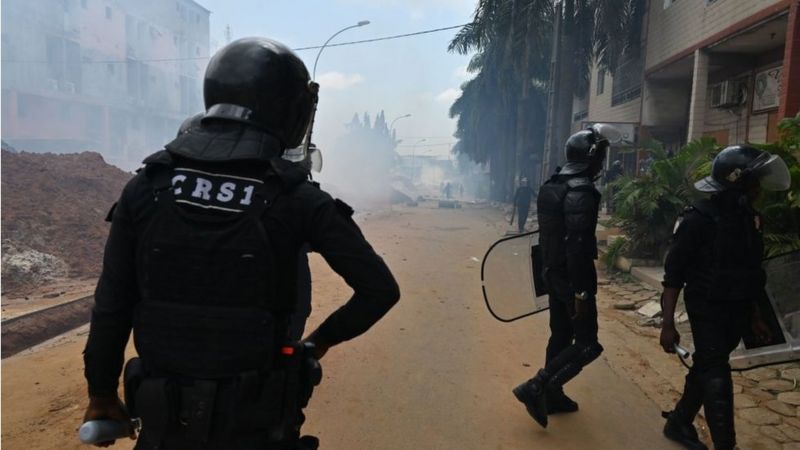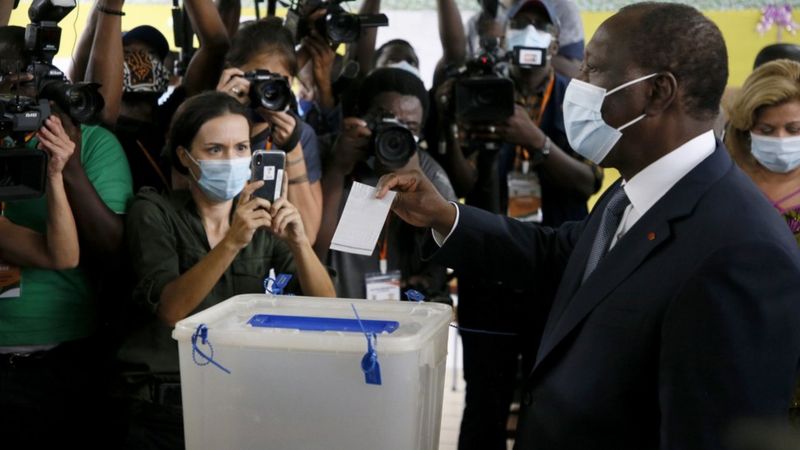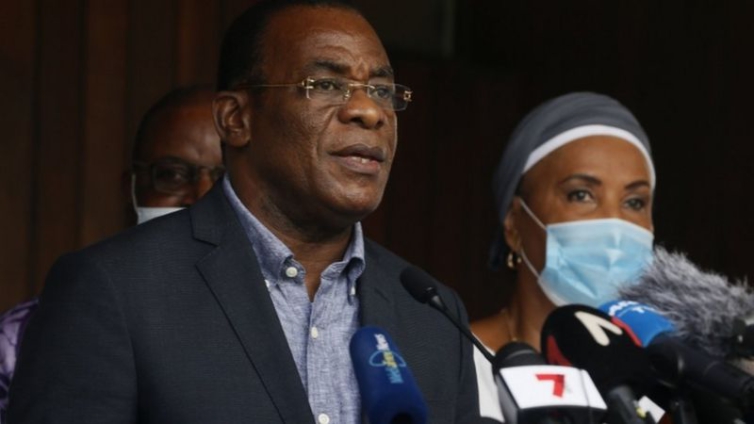Opposition leaders in Ivory Coast are demanding a "civil transition", following Saturday's presidential poll that their parties boycotted.
Pascal Affi N'Guessan and Henri Konan Bédié say it was illegal for President Alassane Ouattara to stand for a third term as it broke rules on term limits.
But the president's supporters dispute this, citing a constitutional change in 2016 which they say means his first term effectively did not count.
Vote counting is still under way.
At least 16 people have been killed since riots broke out in August after President Ouattara said he would run again following the sudden death of his preferred successor.
At least two people were killed during Saturday's vote.
Key opposition figures are urging mass protests to block what they describe as a "dictatorship".
Mr N'Guessan said on Sunday: "Opposition parties and political groups call for the start of a civil transition."
"[We] note the end of President Alassane Ouattara's mandate on 31 October and call on the international community to take note," he added, saying a civil transition was needed to "create the conditions for a fair, transparent and inclusive election."
Several polling stations were ransacked in opposition strongholds on Saturday and election materials were burned.
In the eastern town of Daoukro, protesters erected roadblocks. Meanwhile tear gas was used to push away demonstrators who gathered close to where the president cast his ballot in the main city, Abidjan.

At least two monitors from the independent election group Indigo Côte d'Ivoire were attacked, the Washington Post reports. It quotes the group as saying 21% of polling stations were closed during the day.
But the electoral commission head called the disturbances on Saturday "minimal", saying they "only affected 50 polling stations out of 22,381".
Some 35,000 security officers were deployed across the country to transport election materials and ensure safety, the security minister said.
After voting in Abidjan on Saturday, Mr Ouattara called for an end to the protests.

"I call on those who called for civil disobedience, which led to the loss of life, to stop," he said.
"They should stop because Ivory Coast needs peace, these are criminal acts and we hope that all this can stop, so that after the election this country may continue on its course of progress, which it has enjoyed over the last few years."
Why is it so controversial?
According to the constitution, Ivory Coast has a two-term presidential limit. Mr. Ouattara - who has been elected twice - initially said he would stand down.
But, in July, the ruling party's previous presidential nominee, Prime Minister Amadou Gon Coulibaly, died of a heart attack.
Mr Ouattara subsequently announced that he would run for president after all.
His supporters argued that a constitutional change in 2016 reset the clock and that his first term did not count.
His opponents do not share that view, arguing instead that it is illegal for Mr Ouattara to run for a third term.
What's the background to the tension?
There has been a decades-long quarrel between some of the country's leading political figures.
In 2010, Laurent Gbagbo, who was president at the time, refused to concede to Mr Ouattara following the election that year. This sparked a bitter civil war.
More than 3,000 people were killed in the five months of violence.
Mr Gbagbo also put himself forward to stand in this year's election but the electoral commission blocked him because he had been convicted in the Ivorian courts.
He was one of nearly 40 potential candidates who were turned down by the commission.
Who are the four presidential candidates?
- Alassane Ouattara, 78, economist. Became president in 2011, serving his second term after years in opposition. Party: Rally of Houphouëtists for Democracy and Peace (RHDP)
- Henri Konan Bédié, 86, career politician. Served as president between 1993 and 1999, deposed in coup. Party: Democratic Party of Ivory Coast (PCDI)
- Pascal Affi N'Guessan, 67, career politician. Served as prime minister between 2000 and 2003 under then-President Laurent Gbagbo. Party: Ivorian Popular Front (FPI) faction
- Kouadio Konan Bertin, 51, career politician, known as KKB, was once youth leader in the former ruling Democratic Party of Ivory Coast, is now an MP. Independent candidate
Latest Stories
-
Kounde strike wins Copa del Rey final for Barcelona
3 hours -
Is NPP crying more than the bereaved in the Chief Justice saga?
5 hours -
“Elements within NPP worked against me for supporting ‘Ken must go'” – Cynthia Morrison
6 hours -
IMF Boss commends finance minister for strong commitment to economic reform
6 hours -
Cynthia Morrison advises Ghanaian women to diversify their skills to build wealth
6 hours -
UK deports 43 immigration offenders to Ghana and Nigeria
7 hours -
Piwak Natural Health urges Akosombo victims to rebuild with new donation
7 hours -
Ghana’s Para athlete Gilbert Ampiah wins bronze at Marrakech Grand Prix 2025
7 hours -
6 dead in Adansi Dompoase crash involving VIP bus and sprinter
7 hours -
Saturday’s heavy rainstorm caused outages within our network – ECG
8 hours -
Police arrest 3 over gold robbery at Wassa Afransie
9 hours -
Against all odds: Zinabu Issah clinches silver for Ghana at WPA Marrakech 2025
10 hours -
ASFC 2025: Ghana girls complete host-and-win mission after beating Uganda
10 hours -
NPC President congratulates new GOC Executives
10 hours -
Stonebwoy displays maturity amid Aisha Modi’s attacks: a masterclass in brand integrity and respect
10 hours

